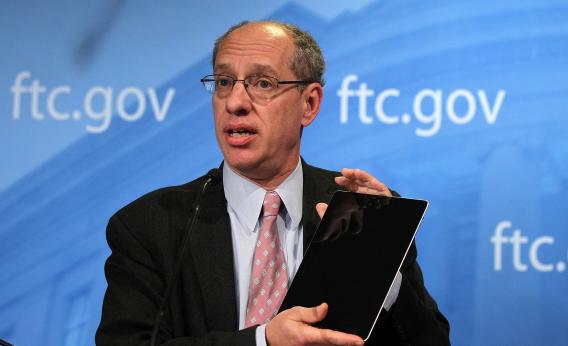The Federal Trade Commission on Thursday unanimously cleared Google of charges that it has been stifling competition by manipulating its search results to promote its own products—such as its shopping, travel, and local results pages—above those of its rivals. It’s not that Google doesn’t ever manipulate its results in that way, FTC Chair Jon Leibowitz acknowledged. Rather, it’s that those search tweaks “could be plausibly justified as innovations that improved Google’s product and the experience of its users.”
In a press conference, Leibowitz cited the philosophy that U.S. antitrust law should be about “protecting competition, not competitors.” In other words, when Google searches bring up Google results, it may hurt Yahoo, but it doesn’t necessarily hurt the consumer, who could just as easily search Yahoo or Bing if she wanted different results. And the FTC bought Google’s argument that those biases in its search results could actually benefit users, by preventing other sites from gaming its system. By way of example, Leibowitz mentioned a 2011 New York Times article about how J. C. Penney used search-engine optimization tricks to bump its results to the top of Google’s results for everything from “dresses” to “area rugs.”
Of course, Google has plenty of ways to solve that problem, and bumping Google Shopping results to the top of the page is only the most self-serving of those options. So why did the FTC give Google the benefit of the doubt?
Because it recognizes that the Internet economy is seismically active. That was the big lesson of the Justice Department’s 1990s case against Microsoft, which looked like an indomitable fortress at the time, but whose foundations had begun crumbling even before the government rendered its antitrust verdict. Is Google exerting some monopolistic power today? Sure. But the barriers to entry in the information industry today are nothing like those of, say, the landline communications industry in the time of Ma Bell. Google’s lead in the Internet search market will last only as long as the public believes that Google delivers the best results. And even now, its power to use that lead to get a leg up in other sectors is far less than that of Microsoft in the 1990s. Whereas Microsoft used Windows to bludgeon some 75 percent of American Internet users into browsing the Web on its atrocious Internet Explorer, Google so far has failed to convince many people to switch from, say, Facebook to Google+. Meanwhile, rivals like Facebook, Amazon, and Apple, not to mention Microsoft, stand a fair chance of convincing more people to use their own search products in the years to come. In Leibowitz’s words, “It’s a dynamic industry, and you want to be careful before you apply sanctions.”
Exactly so. Which is why today’s FTC settlement makes perfect sense in today’s climate. Google didn’t get off the hook altogether. Under one of its two agreements with the FTC, it must license important patents to some of its smartphone rivals, which seems like a clear win for consumers. The other agreement requires it to give online advertisers more flexibility to use rival ad platforms. Google must also stop unilaterally scraping key information from other sites, like Yelp ratings of businesses, for use in its own results. Those concessions are in keeping with the new regulatory trend of poking big tech companies here and there to crack down on specific behaviors, as opposed to tackling them head-on as illegal monopolies.
As my colleague Farhad Manjoo wrote way back in 2009, “Prosecuting tech giants for getting too big is so last century.”
